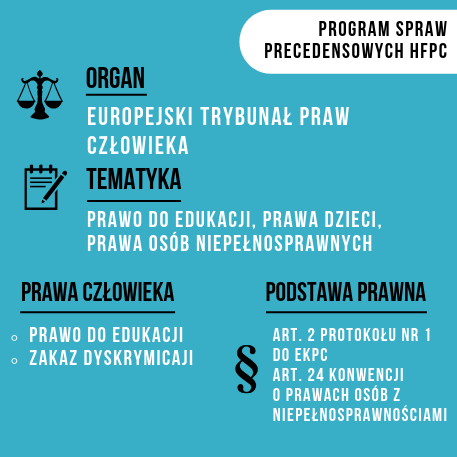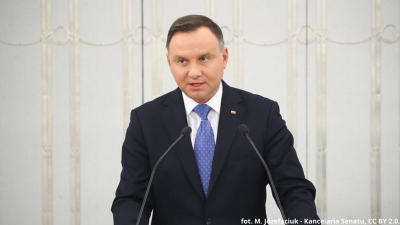
The Helsinki Foundation for Human Rights and the Forum for Human Rights have submitted an amicus curiae brief to the Strasbourg Court in a case brought against Romania, which concerns a student with special educational needs. The brief emphasised that students with disabilities faced difficulties in exercising their right to education not only in Romania but also elsewhere in Europe.
Bullied by peers, teachers and the headmaster
The case of M.C. v. Romania concerns a boy diagnosed with special educational needs (including the oppositional defiant disorder) who alleges that he was harassed because of his disability in a public school. The applicant allegedly experienced bullying from other students but also from teachers and the school’s headmaster.
Initially, thanks to the cooperation between the school and a non-governmental organisation, it was possible to develop an effective model of supporting the boy in the educational setting. The situation changed after the school terminated its collaboration with the NGO: the individual support plan was discontinued, and the negative behaviour of students and teachers escalated. This is why the student also complains that the school had failed to provide conditions appropriate to his specific educational needs. This forced him to transfer to a private institution where he continued his education and was provided with appropriate and personalised support.
The applicant’s parents initiated a number of administrative and civil proceedings, but their claims and complaints were dismissed. The headmaster was charged and convicted of mistreatment of the student in criminal proceedings.
The HFHR and Forum for Human Rights submit their amicus curiae brief to the Strasbourg Court
The application filed with the Court raises a number of complaints, but the organisations focused on the brief on the issue of the right to education, which is protected by Article 2 of the Protocol to the European Convention on Human Rights.
The amicus curiae brief stresses that the implementation of the right to education in the M.C. case should be considered in the light of the UN Convention on the Rights of Persons with Disabilities, which obliges States to ensure an inclusive education system which enables people with disabilities to be integrated at all levels of education. Furthermore, the Convention prohibits disability discrimination in access to education and points to the need to guarantee reasonable accommodation for people with disabilities in the course of their education.
The brief describes the functioning of education systems for students with disabilities in Poland, the Czech Republic and Slovakia. These countries are described as still affected by many barriers and difficulties in providing access to education for persons with disabilities. The organisations have also referred to scientific evidence that students with disabilities are particularly vulnerable to peer violence at school, which can hinder their exercise of the right to education.
In M.C. v. Romania, the European Court of Human Rights will have the opportunity to strengthen the standard of protection of the rights of persons with disabilities. This, in turn, will have an impact on the situation not only in Romania but also in other European countries, including Poland.


